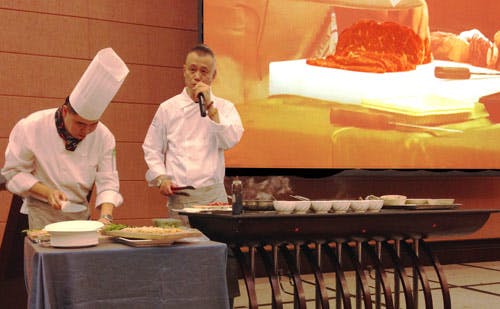Beijing Pork Seminar Covers Wide Range of Topics

Master Chef Charles Lai (right) conducts a cooking demonstration at a U.S. pork seminar in Beijing
In its continuing effort to expand the presence of U.S. pork in China, USMEF recently hosted nearly 100 key food industry professionals at an educational seminar in Beijing. Participants were given hands-on demonstrations of proper pork handling, storage, cutting, merchandising and cooking techniques.
To kick off the event, USMEF Marketing Manager Ming Liang provided an introduction of USMEF and an overview of U.S. pork production.
“Seminars like this are a great way to connect directly with the people responsible for purchasing and distributing pork in China,” he said. “In this setting, we can address specific questions about U.S. pork and convey information through hands-on demonstrations. When participants are able to share these details with their customers, it helps expand their business.”
Two well-known experts were on hand to demonstrate handling, cutting and cooking methods. Retail specialist Kody Cheung focused on proper freezing and defrosting techniques, while also discussing proper shaping and packaging of pork products. Cuts featured in these demonstrations included bone-in pork butt, pork belly, CT butt and boneless ham.
Master Chef Charles Lai followed with a cooking demonstration, offering participants a chance to compare the flavor and texture of U.S. pork with cuts produced locally. Attendees sampled several U.S. pork dishes including sweet-and-sour flavored ham, ham with sweet peppers and Italian-style piccata.
“China is a mainstay market for certain U.S. pork items, especially on the variety meat side,” said Joel Haggard, USMEF senior vice president for the Asia Pacific. “But in order to expand the customer base for muscle cuts, it’s extremely important that we demonstrate the quality and consistency that sets U.S. pork apart from the competition. For customers to fully capitalize on those attributes, proper handling, packaging and merchandising are absolutely critical – and that’s why a seminar like this delivered so much value for the participants.”
Funding support for the seminar was provided by the Pork Checkoff.
